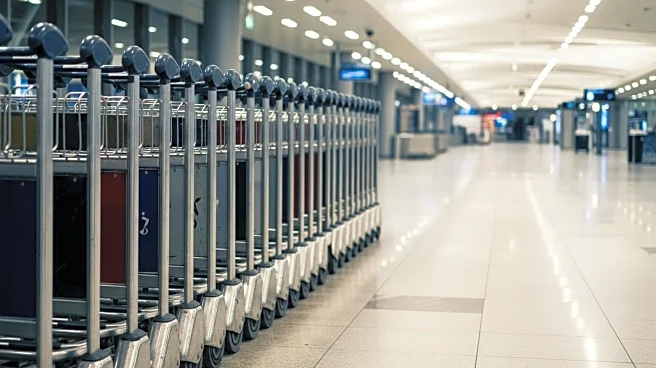What's Happening?
Ground handling companies (GHAs) are reportedly struggling with inefficiencies and reduced profitability due to an overstaffed workforce. Industry experts suggest that these companies need to streamline their workforce, engage personnel permanently, and provide professional training to improve operations. Seyi Adewale, CEO of Mainstream Cargo Limited, highlighted these issues at the 21st Akwaaba African Travel Market in Lagos. He pointed out that different airlines use various technological solutions, which complicates the air-cargo process and increases costs. Additionally, inadequate communication between key segments in the air-cargo business, such as airlines, customs, and GHAs, leads to higher charges for consignees and increased operational costs for airlines.
Why It's Important?
The inefficiencies in ground handling operations have significant implications for the air-cargo industry. Overstaffing and lack of proper training can lead to increased operational costs, which are often passed on to consumers in the form of higher charges. This situation can affect the competitiveness of airlines and GHAs, potentially leading to higher prices for air travel and cargo services. Moreover, the lack of effective communication and technological integration between different segments of the air-cargo process can hinder the industry's ability to operate efficiently, impacting overall service quality and customer satisfaction.
What's Next?
To address these challenges, ground handling companies may need to invest in better training programs and technology to streamline operations. This could involve adopting standardized technological solutions across airlines and GHAs to improve communication and efficiency. Additionally, there may be a push for regulatory changes to encourage more efficient practices and reduce unnecessary costs. Stakeholders in the industry, including airlines, GHAs, and regulatory bodies, will need to collaborate to implement these changes effectively.
Beyond the Headlines
The issues faced by ground handling companies highlight broader challenges in the logistics and transportation sectors, where technological integration and workforce management are critical for efficiency. The situation underscores the need for continuous innovation and adaptation in the industry to meet evolving demands and maintain competitiveness. Furthermore, the reliance on technology and the need for a skilled workforce emphasize the importance of investing in education and infrastructure to support these sectors.









